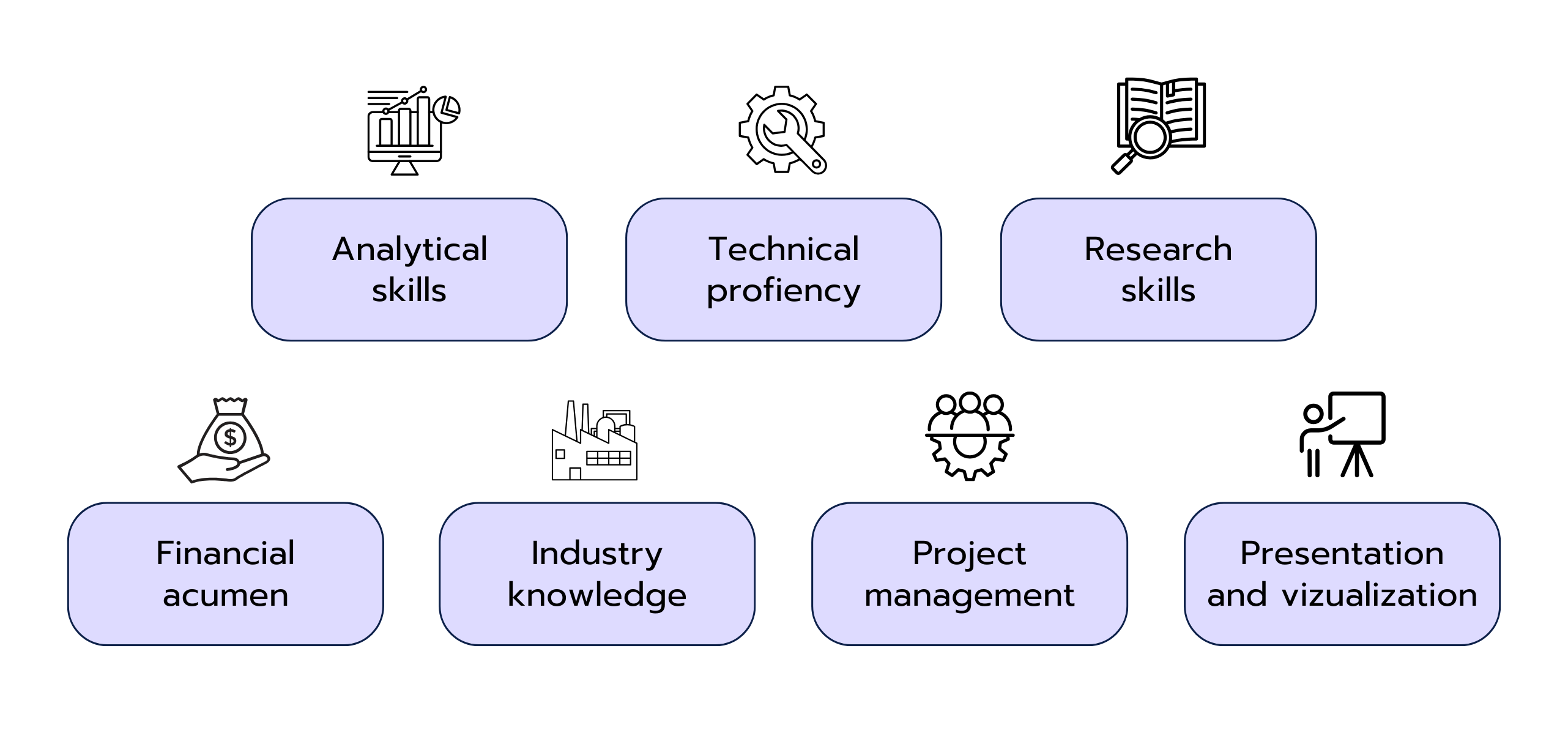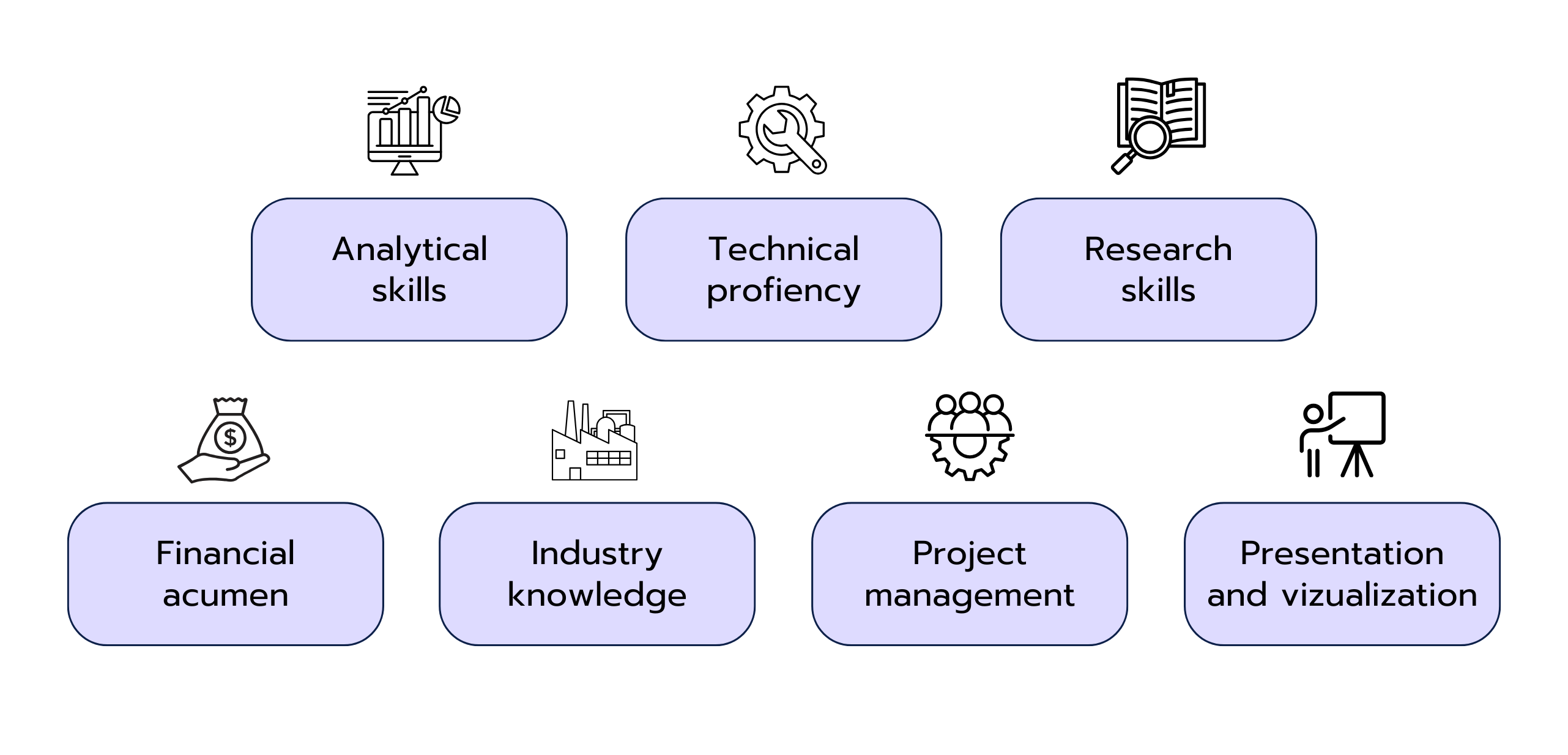If you've always wanted to tackle business problems and come up with smart solutions, consulting is the place for you. It’s not just about big words and impressive presentations. It’s about having the right tools in your toolbox. And by tools, I mean skills. The perfect mix of number crunching, data analysis, teamwork, and communication can make you a great consultant.
You might be wondering: “What skills do I need to stand out in consulting?” 🧐 Don’t worry! We’ve put together a handy guide for you. Our list of the most important skills for consultants is a reference you can use before you step into your dream company.
In this article, we’ll introduce you to the key skills every consultant should have. These skills are your ticket to positioning yourself, impressing clients, and succeeding in your career.
Analytical Skills
Analytical skills - sounds fancy, right? But what does it mean, and why is it so crucial for consultants? Let's break it down.
In its essence, analytical skills mean the ability to take a heap of data or information and make sense of it. It's the talent of spotting patterns, identifying problems, and predicting potential outcomes. Think of it as being a detective, but for businesses. Instead of solving crime mysteries, you're solving company puzzles.
There are 3 main aspects to analytical skills:
- Data Analysis and Interpretation:
In today's digital age, businesses have more data than they know what to do with. As a consultant, you'll be handed chunks of this data, and it's your job to sift through it, interpret what it means, and present it in an understandable manner. This might involve figuring out why a company's sales have dipped in the past quarter or predicting where they might be in the next year. The better you are at understanding and interpreting this data, the clearer your insights will be. - Quantitative Reasoning:
Numbers, numbers, numbers! Quantitative reasoning is all about using mathematical concepts to understand and solve real-world problems. It's not just about doing the math; it's about understanding what the math means. Can you look at a set of numbers and gauge a company's financial health or its market position? If you can, you're on the right track. - Financial Modelling and Forecasting:
One of the most sought-after skills in consulting is the ability to create financial models. These models can help businesses predict future sales, costs, and profits. By understanding how different factors might affect a company's financial future, you can guide them towards more profitable decisions. And guess what? Clients love a consultant who can give them a peek into the future!
So, why are analytical skills so important for a consultant?
- Firstly, analytical skills allow you to offer actionable insights. It's one thing to say, "Your sales have dropped," and another to say, "Your sales have dropped because of X, Y, and Z, and here's what we can do to fix it." Clients are looking for solutions, not just observations.
- Secondly, analytical skills help you stand out. With the consulting field becoming increasingly competitive, having sharp analytical skills can set you apart from the crowd. It shows clients that you don't just skim the surface; you dig deep, understand the root causes, and come up with innovative solutions.
In conclusion, befriending analytical skills is your first step into consulting. Sharpen them and nurture them to glide across the tricky parts of consulting’s day-to-day responsibilities.
Remember, every piece of data, every number, has a story. And your job is to tell that story!
Technical Proficiency
When we hear 'consulting', most of us instantly think about slides, strategy documents, and business models. But the fuel that powers those are your technical tools. Often consultants overlook developing their expertise in the tools that they would be using for their daily performance in consulting. While they may not be glamorous, the tools are the powerhouse behind every successful consultant.
Let us explore the various technical skills required for consulting:
- Data Analysis Tools:
Imagine having a gold mine of business data, but no tools to extract it. Analytical tools like Excel, Power BI, and Tableau are the magic wands that transform raw data into insightful visuals and actionable reports. They allow consultants to automate complex tasks, create compelling charts, and make data-driven decisions. Knowing these tools isn't just an add-on; it's a necessity. Ensure that you master these tools from the inside and out, with depth and speed. Some of the most common tools you need to know about are Excel, Power BI, Tableau, Alteryx, and Think Cell. - Other advanced data based and business software:
In some situations, you might be required to use more advanced tools to query databases or company information. Understanding of database tools such as SQL, and CRM/ERP systems can help a consultant be always informed and resourceful on the project.
Why does technical proficiency matter so much for a consultant?
- Efficiency and Precision:
Expertise and master of technical tools can help you do various analysis efficiently and accurately. When used correctly, the technical tools can free up a lot of your time spent on basic analytical tasks and allow you to focus on the storytelling bits. - Informed Decisions:
If you set up your analysis well enough, you can provide quick, efficient, robust, and informed recommendations for your clients. It's one thing to make a recommendation based on intuition, and another to back it with hard data. Evidence-based solutions help make your recommendations more convincing and actionable. - Staying Ahead of the Curve:
The business world is evolving at lightning speed, with new technologies popping up regularly. By mastering technical tools and platforms, you ensure that you're not just keeping up but staying ahead, offering the most up-to-date solutions to your clients.
To wrap it up, while soft skills and strategy might be the face of consulting, technical proficiency is the backbone. It's the engine that powers insights, solutions, and innovations. As you embark on your consulting journey, remember to pack this essential toolkit of technical skills.
After all, it's the bridge between understanding a problem and solving it effectively!
Research Skills
Consulting is often associated with images of consultants working late into the night, armed with spreadsheets and PowerPoint presentations. But before diving into the nitty-gritty of data and strategy, there's an initial step that sets the stage: Research.
So, what makes research such a pivotal skill in consulting?
- Understanding the Market Landscape:
A successful strategy is grounded in understanding. Utilizing databases like IBISWorld, Statista, Capital IQ, or Thompson One, can provide a holistic view of the industry you're diving into. This allows you to gauge market trends, identify competitors, and understand the client's position. - Identifying Existing Practices:
Why reinvent the wheel? By researching past projects from the consulting firm’s knowledge database, and looking up the industrial best practices, consultants can understand what has worked well in similar situations or industries. This forms a solid starting point, from which tailored solutions can then be crafted. - Validating Hypotheses:
Consultants often form hypotheses based on initial data. However, before presenting these to clients, it's vital to validate them. Research helps to either strengthen these hypotheses or pivot in a new direction.
So, why hone your research skills?
- Precision and Credibility:
In the world of consulting, credibility is gold. By basing your solutions on thorough research, you ensure your recommendations are accurate and trustworthy. - Time Efficiency:
A consultant with polished research skills knows where to look and what to look for, making the process swift and more effective. - Building a Strong Foundation:
Before you jump to solutions, understanding the problem in-depth is paramount. Research lays this foundation, ensuring your solutions are not only innovative but also relevant.
In conclusion, research skills might seem basic, but they're paramount. They ensure that every strategy you craft is well-informed, relevant, and impactful. As you refine your toolkit for consulting success, remember that research isn't just the first step; it's the backbone of every great solution.
Financial Acumen
A nice-to-have hard-skill in your consulting backpack, is financial acumen. We see in projects that often financial insights form the backbone of recommendations. In fact, understanding the financial side of businesses is often non-negotiable for consultants.
Let's dive into the heart of what makes financial acumen indispensable:
- Understanding Financial Statements:
These are the report cards of businesses. Whether it's a balance sheet, income statement, or cash flow statement, these documents tell the story of a company's financial health. Interpreting these can help consultants identify areas of strength, potential risks, and opportunities for growth. - Profitability Analysis:
It's not just about revenue; it's about the bottom line. Consultants equipped with financial know-how can pinpoint which products, services, or segments are most profitable and which ones might be dragging a company down. - Investment Evaluation:
Whether a business wants to venture into a new market, launch a product, or invest in new technology, financial acumen aids in assessing the feasibility and long-term profitability of these decisions. - Cost Optimization:
In the ever-competitive business landscape, cutting unnecessary costs can give companies an edge. A consultant with a keen financial eye can identify areas of wastage, suggest efficiency improvements, and enhance overall profitability.
Why is financial acumen the crown jewel for consultants?
- Driving Value:
At the end of the day, businesses seek consulting services to add value. Understanding financial dynamics ensures that every recommendation contributes positively to the bottom line. - Risk Management:
Financial insights help consultants weigh the potential risks and rewards of decisions, ensuring that businesses make informed and sustainable choices. - Informed Strategy:
While market trends and consumer insights are crucial, it's the financial perspective that often determines the viability and longevity of a strategy.
In essence, financial acumen is the bridge between a good idea and a profitable one. For aspiring consultants, it's not just about understanding businesses, but also about comprehending the financial narratives that underpin them. As you fine-tune your consulting toolkit, remember: Financial acumen doesn’t just add to your value; it multiplies it.
Industry Knowledge
Core knowledge of an industry can often be an important asset for a consultant. Many consulting firms also open expert career tracks to hire experienced people from industry roles. Understanding the nuances of specific sectors ensures that solutions provided aren't just theoretically sound, but also practically applicable. Let's decode why industry knowledge stands important:
- Decoding Market Dynamics:
When looking at problems of large companies, we often need to look at the overall market trends and other global factors that might be inter-connected. For example, while Oil & Gas might be at the heart of the Middle-East's economic narrative, it's essential to understand the complex interplay between geopolitical scenarios, supply chains, and evolving technologies within this sector. - Recognizing Shifts:
Sectors evolve. And their market also evolves. The energy sector, for example, is not just about traditional fuels anymore. The world’s push towards sustainability, with clean energy, clean farming, electric technologies, desalination, and others signal a paradigm shift. A consultant with a finger on this pulse can guide businesses more effectively. - Deep-Dive Analyses:
Being acquainted with the broader strokes of an industry is beneficial, but true value emerges from understanding the micro-level intricacies. For instance, knowing global energy trends is commendable, but appreciating the specifics of oil exploration techniques or sustainable energy innovations can be a game-changer.
Why is industry knowledge a nice-to-have for consultants?
- Relevance in Recommendations:
A strategy built on deep industry insight ensures that the advice is not just sound, but also resonant with the client's specific sector challenges. - Building Credibility:
When a consultant demonstrates industry acumen, it fosters a sense of trust. It tells clients that you’re not just a strategist; you understand their world. - Future-Proofing Strategies:
With all economic sectors facing global shifts in areas such as consumer patterns, supply-chain disruptions, and sustainability – a consultant equipped with industry foresight can help businesses adapt and thrive in changing landscapes.
In summation, a consultant's toolkit might be replete with various skills, but industry knowledge sharpens these tools. As you journey through the consulting landscape, remember that understanding specific sectors doesn’t merely add context; it adds depth and dimension to your strategic narrative.
Project Management
In the consulting world, the success of a recommendation often hinges on how effectively it's managed from inception to delivery. That's where the art and science of project management come into play. Navigating through complexities, timelines, and diverse teams requires a unique skill set.
Let's delve into why project management is a cornerstone in consulting:
- Coordinating Moving Parts:
A consulting engagement isn’t just about strategy formulation. It involves a tapestry of tasks – from data gathering, analysis, stakeholder interviews, to crafting presentations. Effective project management ensures these disparate tasks coalesce into a unified whole. - Timely Deliverables:
Clients respect timelines. With multiple workstreams often running in parallel, strong project management guarantees that milestones are met, reviews are conducted, and deliverables are submitted on time. (e.g. Scrum and Kanban) - Resource Allocation:
Knowing which team member excels in what area and allocating tasks accordingly is a crucial facet of project management. It ensures optimal utilization of the team's skills and expertise, leading to higher quality results. - Risk Mitigation:
Every project, no matter how well planned, faces unexpected roadblocks. A consultant with sound project management skills can anticipate potential pitfalls, devise contingency plans, and ensure the project remains on track. (e.g. ITIL)
Why is project management indispensable for consultants?
- Consistency and Quality:
Successfully managing projects ensures a consistent standard of quality across engagements, fortifying the firm's reputation and client trust. - Stakeholder Alignment:
Effective project management means not just internal coordination, but also ensuring that clients and other stakeholders are aligned, informed, and engaged throughout the project. - Maximizing Impact:
A well-managed project doesn't just culminate in a successful deliverable; it maximizes the impact of the recommendation, ensuring that the client derives tangible value.
In essence, while consulting is often seen as an industry driven by insights and strategies, it's the structured discipline of project management that turns these insights into actionable, impactful solutions. As you further equip yourself for the consulting world, remember project management isn’t just an ancillary skill – it's the lighthouse guiding consulting endeavors to success.
Presentation and Visualization
In consulting, a brilliant insight is only as good as how it's conveyed. Presentation and visualization skills not only enhance clarity but also bring strategies and recommendations to life. They serve as the bridge between a consultant's analysis and the client's comprehension.
Let's explore the indispensability of these PowerPoint skills:
- Articulating Complex Ideas:
The world of consulting often entails intricate analyses and multifaceted strategies. Through effective visualization, consultants can distill complex ideas into digestible, easily understood visuals, ensuring the essence of the message is captured and retained. - Engaging Stakeholders:
A well-structured presentation captures attention. By transforming raw data into compelling charts, graphs, and infographics, consultants can make a stronger case for their recommendations and keep stakeholders engaged. - Facilitating Decision Making:
Visual aids serve as an anchor during discussions. When decision-makers are presented with clear visuals, it simplifies the decision-making process, providing a clear view of options, implications, and potential outcomes. - Reinforcing Credibility:
A polished presentation not only conveys the message but also underscores professionalism. It signals to clients that the consultant values precision, clarity, and attention to detail.
Why is presentation and visualization crucial for consultants?
- Emphasizing Key Points:
Visual aids can be used to spotlight crucial data or insights, ensuring they don’t get lost in the broader narrative. - Enhancing Retention:
Studies suggest that visual information is retained at a higher rate than textual. Effective visualization ensures that key messages stay with stakeholders long after the presentation concludes. - Facilitating Collaboration:
Clear visuals and presentations foster more productive discussions, allowing for collaborative brainstorming, feedback, and iterative refinement of ideas.
In summary, as consultants traverse the realm of data and strategy, presentation, and visualization skills act as their translators, converting intricate analyses into a language that resonates with clients. As you continue your journey in the consulting sphere, remember it's not just about what you say, but how you visually express it that amplifies impact.
Conclusion
As we've journeyed through the multifaceted realm of consulting, it becomes clear that this profession is not bound by a single skill or attribute. Instead, it's a harmonious blend of research acumen, financial prowess, deep industry knowledge, project management finesse, and the art of presentation and visualization.
The modern consultant is, in essence, a storyteller, an analyst, a strategist, and a visionary all rolled into one. They not only unearth insights but ensure these insights are effectively communicated, resonating with clients, and facilitating meaningful change. These skills, while individually significant, become truly transformative when used in tandem, reinforcing and elevating each other.
For those aspiring to make their mark in the consulting arena, remember: It's this holistic approach that distinguishes good consultants from great ones. As you step into this dynamic world, aim not just to excel in individual skills but to master the symphony they create when combined. In the end, it's this symphony that crafts impactful narratives, drives business innovation, and shapes industries for the future.






